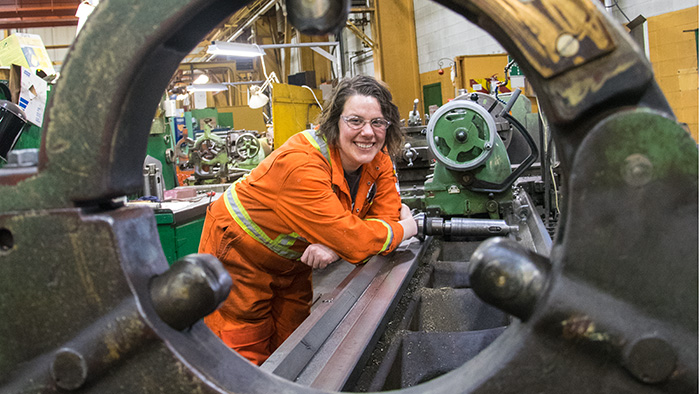She isn’t planning a party this month. But if, on St. Patrick’s Day, you head down to McKinney’s Pub and catch her banging on the drums with her dirty blues rock band Royal Jelly, Lindsay Jordan Strayhorn will probably be sporting more than the usual glint in her eye. Maybe even a big goofy grin.
“I’ll be celebrating on the inside,” she says.
At the end of February, Lindsay passed her Red Seal exam and became a certified machinist.
For anyone, that’s an achievement. Becoming a journeyman is a four-year commitment that dwarfs any University course load: 6,600 hours of on-the-job training, plus six or seven weeks each year in a BCIT classroom.
For Lindsay, there were two added pressures. First, she’s a woman – one of only three tradeswomen at Catalyst Powell River (there are 170 ticketed men), and she’s the only woman in her program in Burnaby. Second, she is a single mom to Emily, who was in Kindergarten when Lindsay started this course.
“Being a single mom, I pay all my own bills and manage my household all by myself,” she says, noting that her 7 am to 3 pm weekday schedule works for her family – and Lindsay is grateful to her mom, who stays with Emily when she’s away at school.
“Having gone to trades school allows me to do that. However, it is really tough to get up and get her where she needs to go that early in the morning – to daycare and then on the school bus. We’re both in bed by 7 pm by the end of the week. But it’s great to be done work by 3 pm.”
This is not where the 36-year-old was planning to be by this age. Nearly two decades ago, she started out taking a degree in archaeology. Lindsay worked for a company in Cultural Resource Management. By law in BC, resource industries must hire archaeologists to search for cultural remains before they’re allowed to cut down trees or drill or excavate. It was exciting – she found projectile points and much more.
“After a while I didn’t want to do it anymore. It was camp work, and even though the pay was good, it was depressing. Whether we found something of not, they’d usually just end up plowing down the forest.”
Soon after she left archaeology, she got married and had Emily. The family moved to Powell River, and then fell apart. Newly single, Lindsay started working at Catalyst as a labourer.
When the company offered its employees four apprenticeships, 14 people applied, including Lindsay. She was awarded one of them because – ironically – she had an arts degree. Having “education” garnered her enough points in the process to win one. At the time, she admits, life was hectic and emotional; she didn’t know what a machinist did.
Now, four years later, she does.
“I make parts of machines out of metal using tools such as a lathe or a milling machine,” she says. “I work in the business of repair. We service the paper machines. If there’s a part that is worn out or broken, some parts are ordered, but time is a factor if they’re jammed and not making paper. They need a new part right now. Or, if a part is ordered and needs to be modified, that’s what I do.”
How does she handle the gender imbalance on the job? No problem, she says.
“I’m a full-fledged member of the team, and I’m good company. Every once and a while I’ll bake something and bring it in, and the guys love that. Ultimately, I just want to be a normal person. I just want to be part of the gang.”
At school, she said, sometimes her classmates would underestimate her, and she’d feel she had to prove herself and her gender. But it was fine, she says.
Lindsay has thought a lot about her decision to choose trades over a Master’s degree. She is very satisfied with her choice. As a young woman, she admits she probably didn’t have the maturity to go into trades – and university helped her grow up. So she doesn’t regret her initial decision (also, she just finished paying off her degree’s student loans; Catalyst paid her tuition.) Now that she’s seen the benefits of trades, she is encouraging her daughter to choose them from the start.
“You get paid, it’s hands-on, and when you’re done you have a job title; I can work anywhere in the world,” she explains. “And, going to trades school is tons and tons of fun. In my class, we all bonded. You’re all studying the same thing, and so you get together every year and it’s like a reunion.”
Given that the apprenticeship sprang up during one of her darkest hours, “It really was a gift,” she believes.








